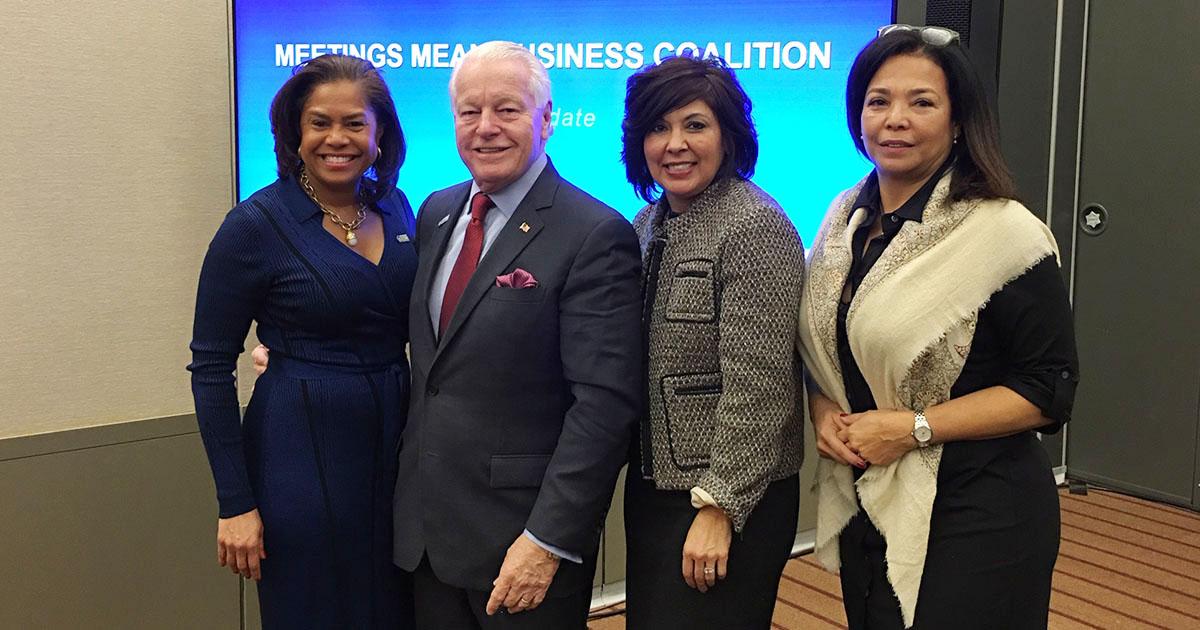While there has been much success over the past 10 years in showing the intrinsic value of the meeting, event, travel and hospitality industries, the Meetings Mean Business (MMB) Coalition is not about to get complacent.
Quite the opposite—the coalition of 60 industry partners is forging into 2019 with new initiatives to ensure that awareness of and education about the value of face-to-face meetings and the importance of unfettered travel remains a top priority.
The coalition, which has a common goal to provide resources, tools and information to show the impact the meeting, event, travel and hospitality industries have on businesses, economies and communities, will introduce new resources this year to battle the “weaponization of travel” and expand its brand to international markets.
Roger Dow, president and CEO of U.S. Travel, said Monday that the industry was caught off guard 10 years ago when the U.S. economy was in the midst of a recession, the insurance industry was seeking government bailouts and comments from U.S. President Barak Obama about meetings and travel had overwhelming consequences.
“We didn’t know a whole lot,” Dow said during a press conference at the Convening Leaders conference at the David L. Lawrence Convention Center in Pittsburgh. “We were caught flat footed as an industry and we’ll never get caught flat footed again.”
MMB Coalition has established itself as a conduit of information and advocacy for an industry that generates nearly US$132 billion in economic impact; $22 billion in tax revenue for local, state and federal governments; and 1.1. million jobs through group meetings, conferences and exhibitions.
Dow said the industry must remain vigilant to “protect meetings from economic and reputational threats.”
“You look at the economic slowdown and what’s going to happen with the [U.S.] government shutdown and how long this will go on,” he said. “There’s safety and security, and the weaponization of meetings and travel. What happens is the people who need the jobs the most get hurt the most. The anti-meeting legislation, the consequences of immigration rhetoric and policies—there’s a lot going on.”
The term weaponization of meetings resulted from a study conducted by MMB and Destinations International that showed how travel boycotts, bans and social legislation—for example, bathrooms bills in North Carolina and Texas—were introduced in hopes to effect political change.
Trina Camacho-London, vice president of global sales at Hyatt Hotels, who is beginning her term as co-chair of the coalition, said there are plans to introduce a suite of resources to help industry professionals.
“Many of the travel bans and boycotts have become increasingly popular tools for our public officials, corporate leaders and grassroots activists to undermine the passage of controversial legislations,” she said. “We are going to offer the tools specific for meeting planners including a playbook that include a checklist of steps planners should take before a travel ban. It will include key considerations for crisis responses, sample communication for event attendees and, most effectively, will provide messaging the meeting planners can use after a travel ban.”
Camacho-London also announced that the MMB Coalition will be expanding its brand to Canada and India under a licensing agreement. Nan Marchand Beauvois, senior vice president of national councils at U.S. Travel, said that while the main focus of MMB is in the United States, there has been an increased international focus in the MMB model.
“It’s grown organically and countries are coming to us and saying we need something similar in our county,” she said.
Canada will focus initially on research, while India is interested in education to “lift the professional level of services for meetings and event professionals in the country,” she said. Germany and Malaysia have also expressed interest.
This move aligns with the recent announcement of the Global MICE Collaborative, an initiative between Meeting Professional International (MPI), the International Association of Exhibitions and Events (IAEE) and the Society for Incentive Travel Excellence (SITE), who have combined forces to provide training and resources to help train and develop professionals involved in the industry segment known as Meetings, Incentives, Conventions and Exhibitions, or MICE, in three growing regions of the world—Africa, Asia and Latin America.
Julie Coker Graham, president and CEO of the Philadelphia Convention & Visitors Bureau and the returning co-chair of the MMB Coalition, said the coalition is focused on continuing to build on the momentum of advocacy, especially through such events as Global Meetings industry Day, which last year involved 206 events in 41 countries and more than 54 million social media impressions. This year’s Global Meetings Industry Day is April 4.
Other key initiatives include mobilizing internal audiences, recruiting validators from business and government, deploying new messaging and materials and socializing more proof points, Graham said.
A video was shown stating that one hour of a face-to-face meeting is equal to five videoconferences, 10 phone calls and 20 emails.
“We’re really looking to build off the success of 2018 and make a concerted effort of sustained engagement,” Graham said.
MPI Blog

